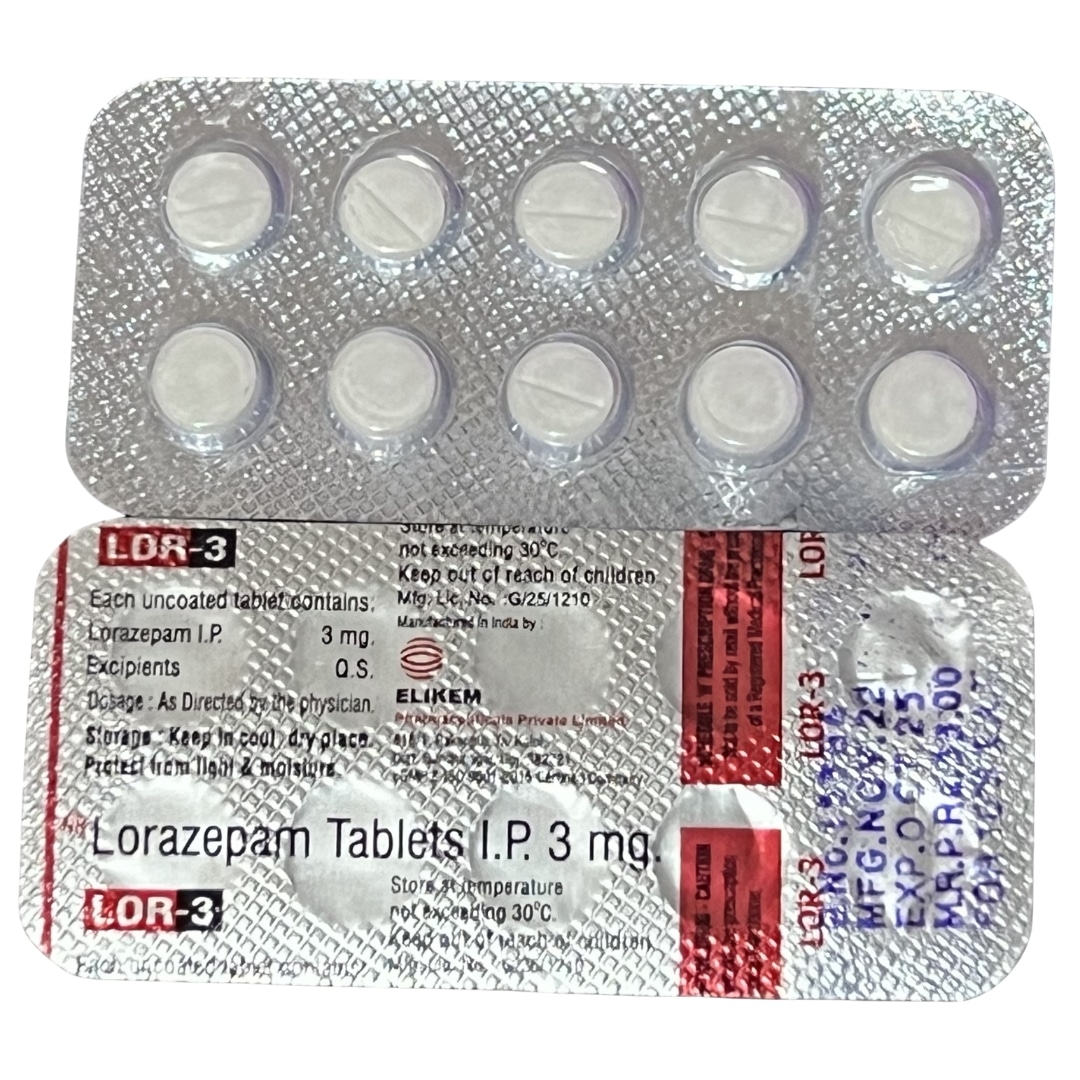Ativan, also known by its generic name lorazepam, is a prescription medication belonging to the benzodiazepine class. These types of medications are commonly prescribed to treat anxiety disorders and insomnia. While highly effective when used as directed, Ativan addiction is common. Unfortunately, Ativan has a high potential for misuse.
Understanding the signs and symptoms of Ativan misuse is crucial for early intervention and treatment, helping to prevent the devastating consequences associated with benzodiazepine addiction.

What Is Ativan?
Ativan is the brand name for lorazepam, a medication belonging to the benzodiazepine drug class. It is best known for its anxiolytic (anti-anxiety) and sedative purposes and is approved for the following medical uses:
- Anxiety disorders, primarily short-term relief of anxiety symptoms
- Insomnia, particularly when the inability to sleep is related to anxiety or stress
- Emergency treatment for epileptic seizures
- Sedation and relaxation for medical procedures
- Alcohol withdrawal management
Ativan is typically taken in tablet form, but can be administered via oral solutions or injection. A healthcare professional determines the dosage and duration of treatment based on the patient’s condition and response to the medication.
Is Ativan Addictive?
Ativan, also known as lorazepam, is a prescription medication used to treat anxiety disorders and insomnia. It belongs to a class of drugs called benzodiazepines, which act on the central nervous system to produce a calming effect.
While Ativan can be very effective in treating these conditions, it also has the potential for abuse and addiction. This is because it works by increasing levels of the neurotransmitter GABA in the brain, which produces feelings of relaxation and sedation.
When taken as prescribed by a doctor, Ativan can be safe and non-addictive. However, when misused or taken for extended periods without medical supervision, it can lead to physical and psychological dependence, also known as Ativan addiction.
Signs of Ativan Addiction
Symptoms of Ativan addiction may include:
- Cravings for Ativan
- Difficulty controlling or stopping the use of Ativan
- Building up a tolerance and needing higher doses to achieve the desired effects
- Withdrawal symptoms when not using Ativan
It is important to note that addiction does not discriminate and can affect anyone, regardless of age, gender, or background. If you or someone you know is struggling with an addiction to Ativan, it is crucial to seek professional help.
Signs and Symptoms of Ativan Abuse
Misuse of Ativan or lorazepam can lead to various signs and symptoms. It’s normal to experience a subtle reduction in anxiety when taking this medication. However, too much can lead to disturbing symptoms.
If someone is abusing lorazepam, you may notice some of the following signs and symptoms:
Behavioral and Psychological of Ativan Abuse
Behavioral and psychological symptoms of Ativan abuse may include:
- Confusion
- Memory problems
- Mood swings
- Agitation or irritability
- Impulsivity
- Poor decision-making
- Withdrawal from social activities
- Neglecting responsibilities
- Relationship problems
- Secretive behavior regarding medication use
Physical Symptoms of Ativan Abuse
Physical symptoms of Ativan abuse may include:
- Drowsiness or sedation
- Slurred speech
- Impaired coordination
- Dizziness or lightheadedness
- Blurred vision
- Headaches
How Ativan Becomes an Addiction
While Ativan is helpful for the treatment of several mental health and medical issues, it carries the potential for addiction due to its effects on the brain and body. Initially, it helps by producing calming effects and reducing anxiety, but with regular use, the body becomes tolerant to the effects of Ativan, and higher doses are needed over time to achieve the same therapeutic effects. This increase in dosage can set the stage for Ativan addiction.
Psychologically, individuals may start to believe they cannot function without Ativan. This reliance can lead to cravings and compulsive use of the drug, even when it’s not medically necessary. The GABA-producing effects of lorazepam create feelings of relaxation and euphoria, reinforcing the desire to continue using the drug.
Despite negative consequences—such as health problems, relationship issues, or legal troubles—individuals continue to use Ativan. This persistence, despite harm, is a clear sign of addiction.
Dangers of Ativan Abuse And Addiction
Misusing lorazepam comes with a potential for addiction, particularly if a person already has struggled with substance abuse addiction. Additionally, Ativan can interact with other medications. When it’s combined with other central nervous system depressants, there’s an increased risk for respiratory depression, a dangerous situation requiring emergency medical intervention.
Ativan Overdose Symptoms
An overdose of Ativan occurs when someone takes more than the recommended amount of the drug. For this reason, overdose can occur as a result of Ativan abuse or when a person forgets they have already taken their prescribed dose.
Signs of an Ativan overdose may include:
- Extreme drowsiness
- Confusion
- Impaired coordination and reflexes
- Slurred speech
- Slowed breathing
- Loss of consciousness
- Seizure
- Coma
- Death
If you or someone you know is experiencing overdose symptoms after taking Ativan, it is crucial to seek help right away. Ativan overdoses can be lethal and require immediate medical attention.
Ativian Withdrawal Symptoms
Withdrawal from Ativan can be a challenging, uncomfortable, and potentially life-threatening experience. After using Ativan for a prolonged period of time, physical dependence can develop. For this reason, it typically occurs after regularly using the medication for an extended period of time or in high doses.
Ativan withdrawal symptoms may include:
- Decreased stress tolerance
- Tremors or trembling in arms and feet
- Sweating
- Muscle cramps
- Nausea and vomiting
- Insomnia
- Agitation
- In severe cases, seizures may occur
If you or a loved one is experiencing signs of Ativan withdrawal, it is important to seek help as soon as possible. It is crucial to understand that stopping Ativan suddenly can be dangerous and should only be done under medical supervision. Abruptly discontinuing the medication can trigger intense withdrawal symptoms and potentially lead to life-threatening complications like seizures.
If you or a loved one are struggling with Ativan addiction, seeking professional help is the best course of action. A reputable treatment center like Vogue Recovery Center can provide comprehensive and individualized care to address both the physical and psychological aspects of addiction and withdrawal.
Treatment for Ativan Addiction
Recovery from Ativan addiction is doable but often requires professional treatment. Programs that help with quitting lorazepam misuse include medical detoxification, therapy, and support groups. With support and guidance, you can manage withdrawal symptoms and address underlying issues contributing to addiction. Developing healthier coping mechanisms is paramount to recovery and is possible with support.
Despite its benefits for medical purposes, the use of Ativan can be a slippery slope. If you feel like you or a loved one is struggling with Ativan addiction, contact Vogue Recovery Centers today. With locations in Los Angeles, Las Vegas, and Phoenix, you can access the help you deserve. There’s no shame in seeking help with addiction.

Medically Reviewed by Kelsey Jones, MS, LPC






